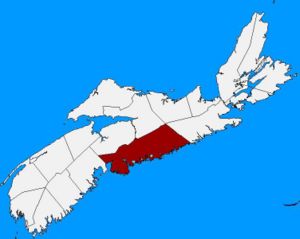Halifax Regional Municipality
The Halifax Regional Municipality (HRM) is a Nova Scotia Regional Municipality created on April 1, 1996 as a result of the Province of Nova Scotia amalgamating the municipalities of the Cities of Halifax and Dartmouth the Town of Bedford and the County Of Halifax. The municipality has an area of 5,490 square kilometres, which is larger than the Province of Prince Edward Island, and the total population in 2006 was 372,679. It contains over 200 communities diverse as urban centres, suburban neighbourhoods, seaside fishing villages and farming communities. The three largest are the metropolitan areas of Halifax and Dartmouth and the community of Bedford.
HRM is divided into 23 districts with each having one councillor, which forms the Halifax Regional Council with a mayor who elected at large. The elected Regional Council and a Chief Administrative Officer form of government govern the municipality. The Chief Administrative Officer reports to the elected Halifax Regional Council. The Halifax Regional Municipality is the capital of the Province of Nova Scotia . The Municipality also includes Sable Island some 160 Kms from the nearest landfall of Nova Scotia.
Facts
- HRM is the youngest incorporated municipality in Nova Scotia
- The two metropolitan communities of Halifax and Dartmouth form most of the urban area of the municipality . They were the last incorporated cities in Nova Scotia when they dissolved on April 1, 1996 . The residents of Dartmouth are still called Dartmouthians and residents of Halifax are called Haligonians . There are some 205 communities within the municipality ranging fishing and farming villages to large urban centers. .
- One Third of Nova Scotia’s Population
- Canada’s second largest scientific centre
- Has 8 degree granting universities and colleges.
- Third largest oceanographic research centre
- Financial centre of Eastern Canada
- Home to Canada’s East Coast Navy
- Has two deepwater ports Halifax Harbour and Sheet Harbour . There is many small craft harbours that are used for the fishing industry .
- Halifax Harbour is considered to be the second largest ice free harbour in the world . Has two container piers , offshore oil exploration base , home to a Canadian Coast Guard base , ocean research centre , a shipyard , an oil refinery , an automobile import facility and a Naval dockyard.
- On December 6, 1917 Halifax Harbour was the location of the biggest man-made explosion the world before the atomic bomb which killed over 1,900 people immediately, the figure raising to well over 2,000 a year later . Around 9,000 more were injured, many permanently;almost all of north-end Halifax and Dartmouth was destroyed.
- Has six weather stations Shearwater Airport (CYAW), Stanfield Airport (CYHZ), Malay Falls(CXMY) ,Beaver Island (CWBV) , McNabs island (CXMI) and Sable Island (CWSA) . The municipality has 2 weather warning areas.
- 400 Kms (250)miles of coastline .
